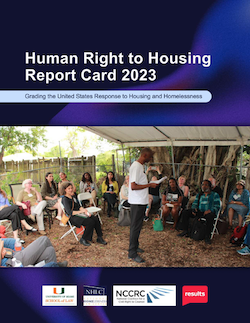Housing is a human right. Inspired in modern times as part of President Franklin Roosevelt’s Second Bill of Rights and later developed by the international human rights community, the right to housing is now increasingly embraced by U.S. advocates who are fed up that “the rent is too damn high” and communities spend three times as much on policing and “housing” people in jail as it would to simply provide adequate housing in the first place. The human right to adequate housing is more than a slogan, it is a well fleshed-out framework of accountability for ensuring housing is more than just four walls and a roof over one’s head, but a safe, stable place where one can live with dignity.
This report is part of the movement for the human right to housing in the United States (U.S.), holding the U.S. accountable to each of the seven international recognized elements of the right: legal security of tenure; accessibility; affordability; availability of services, materials and infrastructure; location; habitability; and cultural adequacy. Each component could include dozens of further examples, but we have selected a few to highlight to show the potential of using the framework as a tool for advocates working on various aspects of the right. We have assigned letter grades to each element, recognizing the relative status of the right and any progress (or lack thereof) over 2022, and taking into account events since our last report card in 2016, as compared to our government’s obligation to ensure it to the maximum of available resources. The report card grades federal government’s response, and shares recommendations for the State and local level as well, where appropriate.

